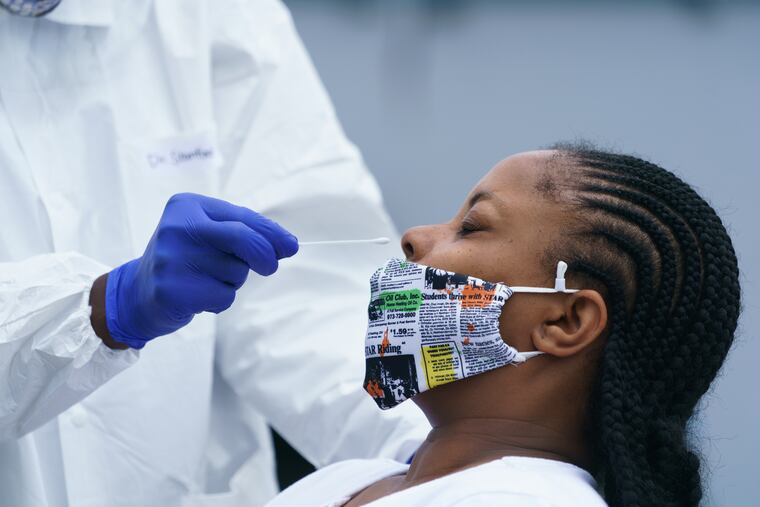How well are Pa., N.J. controlling COVID-19? | Coronavirus Newsletter
Plus, Pa. overpaid some unemployed workers, then slashed their checks

TL;DR: Pandemic monitors such as the respected Coronavirus Resource Center by Johns Hopkins University consistently say Pennsylvania’s percentage of positive coronavirus tests is almost twice as high as what the state health department says. My colleague Marie McCullough explains what’s behind this positively puzzling situation. Pennsylvania accidentally overpaid about 30,000 claims in July for Pandemic Unemployment Assistance. To recoup the extra benefits, the state slashed weekly payments by one-third for affected workers.
— Kelly O’Shea (@kelloshea, health@inquirer.com)
What you need to know:
🗳️ Pennsylvania Gov. Tom Wolf publicly pleaded with President Donald Trump to cancel his planned Saturday rally in Harrisburg, calling his previous campaign events “dangerous” and “manipulative.”
⚰️ For years, Pennsylvania had the most severe death reporting lags in the country. Now, its failure to mandate quicker reporting has fueled wild data fluctuations and mistrust amid the coronavirus pandemic.
👨🎓 New Jersey health officials said coronavirus cases are rising in Gloucester County, where Health Commissioner Judith Persichilli said student housing at Rowan University, both on and off campus, is related to the increase.
⚽ The Archdiocese of Philadelphia’s 17 high schools plan to resume fall sports while continuing to follow health and safety guidelines.
✋ Anthony Fauci, the government’s top infectious disease expert, said the U.S. remains in the first wave of the coronavirus pandemic since cases have yet to return to a baseline level.
🦠 Is herd immunity a realistic way to stop the spread of the coronavirus before vaccines are available? Infectious disease experts explain.
📰 What’s going on in your county? We organized recent coverage of the coronavirus pandemic by local counties mentioned in the stories to make it easier for you to find the info you care about.
Local coronavirus cases
📈The coronavirus has swept across the Philadelphia region and cases continue to mount. The Inquirer and Spotlight PA are compiling geographic data on tests conducted, cases confirmed, and deaths caused by the virus. Track the spread here.
Since May, COVID-19 testing in Pennsylvania has steadily increased, while the percentage of positive tests has steadily fallen. These reassuring trends are even more striking in New Jersey. Both states now report that their positivity rate has been below 5% for at least 14 days — the benchmark for having transmission under control. But wait. Pandemic monitors such as Johns Hopkins University’s Coronavirus Resource Center consistently say Pennsylvania’s positivity rate is almost twice as high as the state says. My colleague Marie McCullough explains what’s behind this positively puzzling situation.
Pennsylvania accidentally overpaid about 30,000 claims in July for Pandemic Unemployment Assistance, or PUA, a benefits program for self-employed or contract workers. The duplicate payments totaled $280 million. To recoup the extra benefits, the state slashed weekly payments by one-third for affected workers. Some recipients, such as Majid Ali, have had their payments cut in half. “I’m sorry, but this isn’t my mistake,” said the Port Richmond resident, who had to borrow money and pawn some belongings to scrape by.
Helpful resources
Symptoms of COVID-19, flu, common cold, and allergies can overlap. How to tell the difference.
If you’ve hit a COVID-19 wall, here are ways to cope.
The coronavirus is mainly transmitted through the air. Here’s how to tell if your ventilation is OK.
How does the virus affect your entire body?
Here’s what to know about traveling safely during the pandemic.
You got this: Falling for the arts
With three shows opening this weekend at Philadelphia museums, it looks almost like the beginning of a normal fall art season. Explore 10 of the season’s new and continuing shows. And don’t forget: You’ll be expected to mask up, and most art museums require timed tickets that must be preordered online.
☎️ Want to learn how to protect yourself from COVID-related fraud? The SEC and FBI will host a free consumer fraud prevention call on Oct. 6.
🍺 Here’s what Oktoberfest looks like this year, and if you should go.
💰 The PHL COVID-19 Fund has awarded $400,000 to 23 Philadelphia-area nonprofits in the latest round of grants.
Have a social distancing tip or question to share? Let us know at health@inquirer.com and your input might be featured in a future edition of this newsletter.
What we’re paying attention to
ProPublica tells the tale of how a Texas businessman with a criminal past convinced elected officials to help him profit from the pandemic.
Now that schools have become more comfortable with remote teaching, the New York Times says that might mean the end of the snow day.
The GOP blasted Obama’s use of an obscure Medicare law that Trump is now using on $200 drug coupons. And so far, Republicans are silent, Stat reports.
Enjoy getting our journalism through email? You can also sign up for The Inquirer Morning Newsletter to get the latest news, features, investigations and more sent straight to your inbox each morning Sunday-Friday. Sign up here.